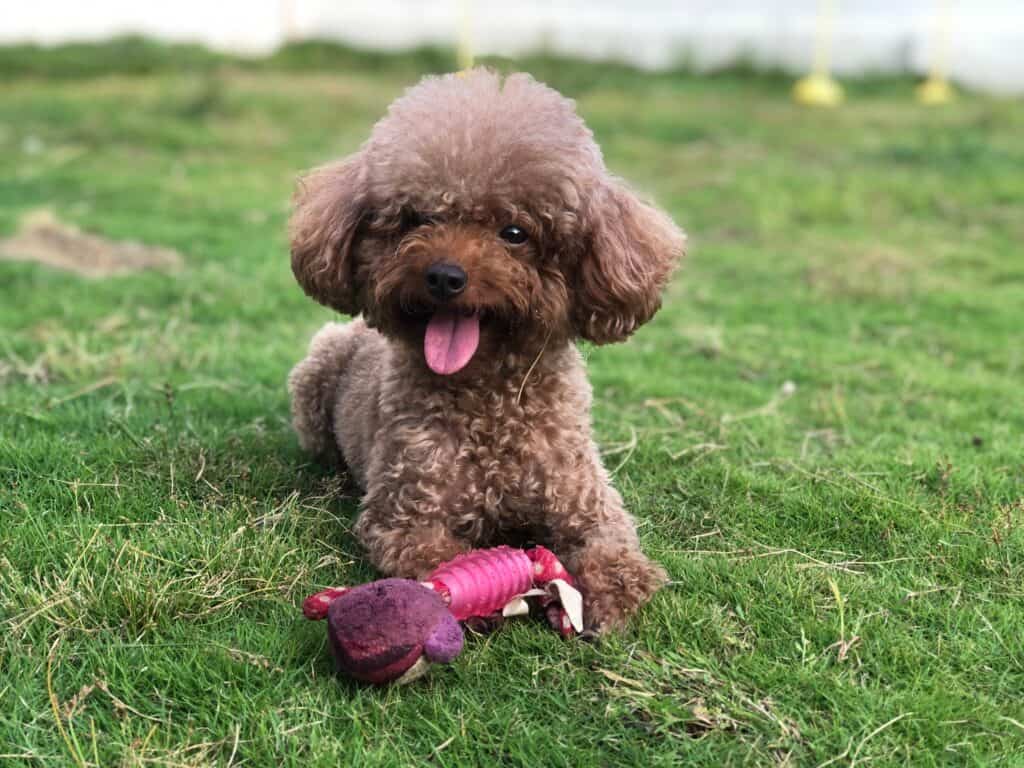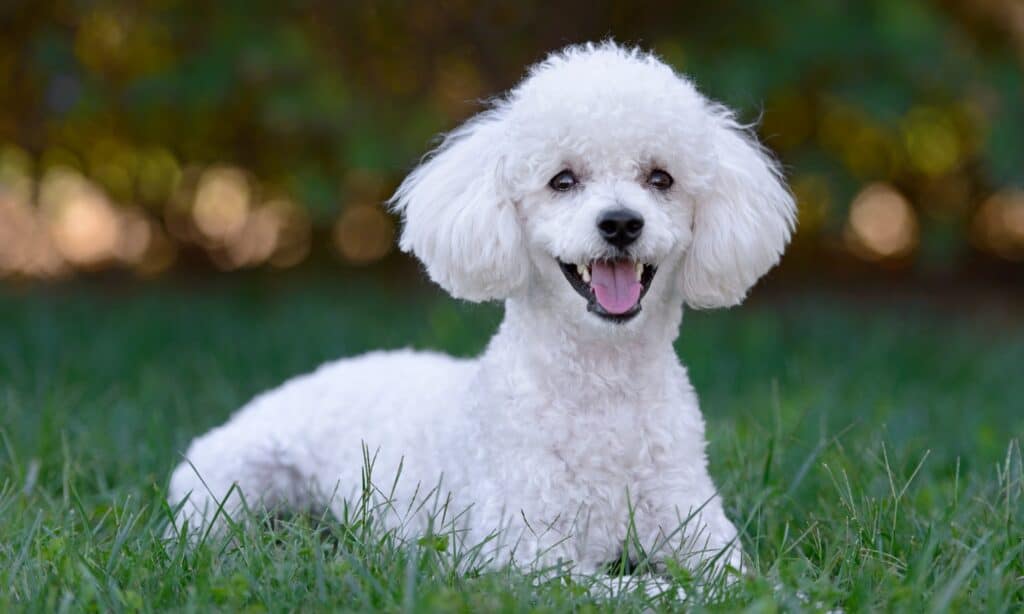Poodles are unbelievably cute dogs famous for how fun-filled and lively they can be. They come in varying sizes and are the perfect dog breed for those who want a smart companion and do not mind regular grooming appointments. While poodles are definitely amazing dogs, the dental community has quite a lot to say about their teeth.
These active dogs have a reputation for developing tooth problems rather quickly. The question is, do they really have bad teeth, or is this a case of bad press? In this article, you will get all the details about poodle teeth.
Poodle Teeth Structure

Poodles have 42 teeth; 10 molars, 16 premolars, 12 incisors, and four canines.
©Kwan Kajornsiri/Shutterstock.com
All dog breeds except chow chows have a set of 42 teeth, which is more than humans’ 32. Poodles are definitely no exception to this rule and have 42 teeth comprising molars, premolars, canines, and incisors. Let’s take a look at a poodle’s teeth structure.
Molars
Molars are flat teeth usually found in the back of the mouth in dogs, humans, and all mammals. When we chew food, we move it towards the backs of our mouths because it is convenient to do so, and our molars are also located there, conveniently by nature.
Poodles have this same dental arrangement and use their molars to chew and grind their food. Adult poodles have 10 molars in total, which are unevenly distributed between the upper and lower jaws.
The upper jaw has only four molars, with two on the left and right sides. The lower jaw, which has more, has a total of six molars, with three on each side.
Premolars
Premolars aren’t too different from molars; they have similar functions as they also help poodles chew and grind. The major differences between poodles’ molars and premolars are their sizes and shapes. In all mammals, premolars are located just before the molars, which are at the farthest end.
Adult poodles have 16 premolars which are evenly distributed between the right and left sides of the upper and lower jawbones. The upper jaw has eight premolars, with four on the left and right, and the lower jaw also has four on each side. Poodles are more reliant on their premolars to chew their food.
Incisors
Incisors are the small teeth at the front of poodles’ mouths. They are 12 in number and have various diverse uses. Poodles use their incisors to tear meat from bones and grab objects. They also use these teeth to groom themselves by scratching their fur and using them to break their food into smaller pieces.
Poodles’ incisors are evenly distributed between the upper and lower jaws. The upper jaw and lower jaws both have 6 incisors on the front.
Canines
Canines are perhaps one of the most interesting teeth types that dogs have. Canines are sometimes called fang teeth and have sharp pointy ends. They use these teeth to puncture and hold on to things firmly, which is why dogs’ grips are forces to be reckoned with. Poodles, like all dogs, have four fangs, two on the upper jaw and two on the lower jaws.
Humans also have canines, but they are much less pronounced than dogs’. One fun fact is that our ancestors used their canine teeth to fight for mating rights.
Baby Poodle Teeth

Poodles’ teeth from three to four weeks, up until six to eight months.
©HelloAnnMe/Shutterstock.com
Baby poodles are born without teeth. By three to four weeks, poodles begin to grow milk or deciduous teeth. This stage is called the teething stage and may be painful for the puppy. Buying your puppy chew toys is one of the most popular methods to soothe them during teething. Your vet will also recommend other ways to support your puppy during this period.
Puppies’ molars don’t sprout alongside milk teeth. At about 12 weeks, their milk teeth fall out, and their permanent teeth begin to grow. The molars also begin to grow, and by six months, they already have all permanent teeth. Poodles’ teeth from three to four weeks, up until six to eight months.
Do Poodles Have Bad Teeth?

Poodles are more prone to dental problems than other dog breeds.
©iStock.com/tsik
While poodles do not have “bad” teeth, they are indeed more prone to teeth problems than other breeds. The Animal Health Clinic even states that toy poodles, in particular, are more likely to develop dental problems. Dental issues in poodles usually begin with the build-up of tartar, leading to an infection.
Infections from dental disease allow infections that can affect their kidneys into their bloodstream, cutting the poodle’s lifespan short. Dental issues are why much emphasis is placed on caring for poodles’ teeth.
How to Care For a Poodle’s Teeth
It’s important to know how to care for your poodle’s teeth in order to avoid serious dental issues. Below are some ways to go about that.
1. Hire a Full-Time Veterinarian
The best way to care for your poodle’s teeth is to invest in a registered and qualified veterinarian. Having an expert will ensure that you monitor your poodle’s teeth and spot problems before they become big issues. Having a full-time vet is better because they will be able to understand your dog’s history.
Your vet will carry out routine cleanings for your doggy’s teeth and ensure that they have all supplements and drugs they need to support the health of their teeth. Of course, this also means that you need to ensure that your poodle meets up with all their appointments.
You also have a responsibility to read more about poodles’ health and carry out simple routine dental checks. Having bad teeth can affect your pet’s ability to eat, chew, grab things, or groom themselves, and can also kill them.
2. Brush Your Poodle’s Teeth
Your veterinarian will prescribe a safe paste and toothbrush for your poodle. To keep your dog alive and healthy for a long time, brush its teeth according to schedule. Be sure to use only approved toothbrushes and pastes, and ensure that you brush your dog’s teeth patiently, so brush times don’t become wartimes.
3. Upgrade Your Poodles Food
The type and quality of food your poodle eats should dictate some parts of its dental healthcare. Kibble is harder on the teeth but doesn’t stain them, while wet food is softer on the teeth but causes a lot more stain. However, wet food is also healthier and tastier than dry food or kibble.
Picking your dog’s meal type shouldn’t be done lightly and, in many cases, their individual tastes dictate the choice. Ensure that you understand the type of care that comes with each choice and ask for clear instructions and advice from your vet.
Up Next:
Toy Poodle vs. Miniature Poodle vs. Teacup Poodle
Doodle vs. Poodle: Is There a Difference?
The photo featured at the top of this post is © Diana Kellior/Shutterstock.com
Ready to discover the top 10 cutest dog breeds in the entire world?
How about the fastest dogs, the largest dogs and those that are -- quite frankly -- just the kindest dogs on the planet? Each day, AZ Animals sends out lists just like this to our thousands of email subscribers. And the best part? It's FREE. Join today by entering your email below.
Sources
- Foothill Pet Hospital, Available here: https://www.foothillpethospital.com/pet-info/pet_info-dental_formulas.html
- Animal Health Clinic, Available here: https://ahcfargo.com/client-resources/breed-info/toy-poodle/
Thank you for reading! Have some feedback for us? Contact the AZ Animals editorial team.






